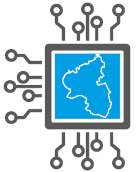FOR 5359: DFG Research Group KI-FOR FOR 5359: Deep Learning on sparse chemical process data
- Duration: 01.11.2022 - 31.10.2026
Funding Organization: DFG
Prof. Dr. Marius Kloft
University of Kaiserslautern-LandauThe German Research Foundation (DFG) is funding the new research group "Deep Learning on sparse chemical process data" for four years with around 3.5 million euros. It is coordinated at the Technical University of Kaiserslautern (TUK). The group is working on making Deep Learning methods, a subfield of Artificial Intelligence, usable for the chemical industry. So far, this has not been possible, especially due to the sparse data available. The interdisciplinary team from computer science and process engineering is developing new methods for this purpose. These are intended to help detect errors in chemical processes at an early stage in order to avert accidents and shutdowns.
Searching millions of images within fractions of a second for a keyword such as "beach" or using speech recognition to have a song played for you on your streaming service. Deep learning - a branch of artificial intelligence - makes such things possible. With the help of huge amounts of data, algorithms learn; they classify, sort and filter data. The technology is used in many areas, such as medicine, agriculture and robotics.
However, this has not yet been the case for processes in the chemical industry. "There is much less data here than, for example, in an image search on the web, and in some cases there is no data at all or companies do not make it available," says Professor Dr. Marius Kloft, who heads the Intelligent Systems department and the Machine Learning working group at TU Kaiserslautern and is the spokesperson for the new DFG research group. "In addition, often all data also looks the same, which makes learning here much more difficult." For example, in a chemical plant, the same process is always run under the same conditions over a long period of time, such as the conversion of raw materials into products. Sensors then always measure the same temperature, pressure and so on.
Professor Dr. Marius Kloft, spokesman of the new DFG research group (left), together with junior professor Dr. Sophie Fellenz and junior professor Dr. Fabian Jirasek
They work together on new Deep Learning methods (from left to right): Junior Professor Dr. Fabian Jirasek, Professor Dr. Stephan Mandt, Junior Professor Dr. Sophie Fellenz and Professor Dr. Marius Kloft.
https://idw-online.de/de/news798996
AI Focus Areas of the Research Project
Basic Research
- Machine Learning (ML): Anomaly Detection
